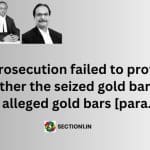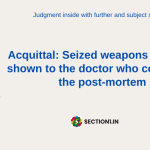If the prosecution failed to prove the identity of seized gold the accused is not liable to prove lawful acquisition of gold
These appeals concerning a significant fraud involving fake Telegraphic Transfers (TTs) that resulted in a loss of Rs. 6.7 crores at Vijaya Bank, Nasik Branch. The Court reviewed the convictions of several accused, including Nandkumar Babulal Soni, who was found guilty under Sections 120B and 411 of the IPC. However, the Supreme Court ultimately set aside Nandkumar’s conviction, determining that the prosecution failed to establish the identity of the seized gold bars as stolen property. Consequently, Nandkumar was entitled to the return of the gold bars, while appeals from Hiralal Babulal Soni and Vijaya Bank for the return of the gold were dismissed.
No Sanction No Cognizance?
The Hon’ble Supreme Court of India quashed the charge sheet and summoning order against the appellant, because the necessary sanction for prosecution under Section 197 of the Code of Criminal Procedure (CrPC) was not obtained. The Court found that the appellant, a public servant, was acting in her official capacity when the alleged offences occurred, and thus, prior sanction was required for prosecution. The Court noted that the sanction was not granted by the competent authority, the Bureau of Indian Standards (BIS), and ultimately denied the sanction, which invalidated the initiation of criminal proceedings against her. Consequently, the appeal was allowed, and the charge-sheet and subsequent orders were quashed.
Before Priyanka Srivastava case it was not required to file affidavits for petitions u/s. 156(3) Cr.P.C
In this judgment the appellants, challenged the dismissal of their criminal revisions by the Calcutta High Court concerning two FIRs filed against them for serious allegations including forgery and cheating. The appellants argued that the FIRs were motivated and false, and contended that the second FIR violated the requirement for an affidavit as established in the case of Priyanka Srivastava vs. State of Uttar Pradesh (2015) 6 SCC 287. However, the Supreme Court upheld the High Court’s ruling that the requirement for an affidavit was prospective and not applicable to complaints filed prior to the judgment in Priyanka Srivastava. Consequently, the Court dismissed the appeals, affirming the High Court’s decision and allowing the appellants to seek discharge if charges had not yet been framed.
If the accused failed to put question to the witness the presiding judge is duty bound to put that question under Section 165 of the Evidence Act
This Supreme Court judgment outlines a case where the State of Madhya Pradesh appeals against the acquittal of Balveer Singh, the accused, from charges related to the murder of his wife, Birendra Kumari. The case includes a detailed index that covers the prosecution’s case, the incident details, oral evidence, the trial court’s judgment, the impugned order by the High Court, analysis of the evidence, and concluding remarks. The document emphasizes the legal principles involved, particularly concerning circumstantial evidence and the applicability of certain sections of the Indian Penal Code and the Evidence Act.
Natural justice must be followed before impounding passport under section 10(3) Passports Act, 1967
The Hon’ble Supreme Court of India, in this case quashed the orders directing the initiation of extradition proceedings against the appellant and due to his non-appearance in a domestic violence case, which was deemed unjustified as it stemmed from the impounding of his passport without due process. The Apex Court recognized the irretrievable breakdown of the marriage between the parties, who had cohabited for only 80 days and had been living separately since May 2018, amidst numerous legal disputes filed by both parties against each other. Consequently, the Court dissolved the marriage under Article 142 of the Constitution of India, ordered the appellant to pay a lump sum of Rs. 25 lakhs as permanent alimony to the respondent, and directed the release of the appellant’s passport within a week.
Two firs nothing wrong
The judgment pertains to a legal case involving the State of Rajasthan against Surendra Singh Rathore, who is accused of corruption and bribery related to the licensing of bio-fuel pumps. The case arose from complaints filed by individuals associated with bio-fuel companies, alleging that Rathore demanded bribes for the sale of bio-diesel and the renewal of licenses. Two FIRs were registered against him, with the second FIR being contested by Rathore as not disclosing fresh incidents. The judgment addresses the arguments regarding the legality of filing multiple FIRs and the powers of the police to investigate cognizable offenses. The document references relevant legal precedents that highlight the proper procedures for investigation and the balancing of citizens’ rights with police powers. Apex court found that the second FIR, which pertained to a broader conspiracy involving widespread corruption in the Bio-fuel Authority, was distinct from the first FIR and thus permissible. The High Court’s ruling was overturned, restoring the second FIR to allow for further investigation, emphasizing the importance of addressing corruption in the public interest. The Court directed the completion of the investigation promptly, highlighting the need for accountability in public service.
Section 437(1) & (2) Cr.P.C is a stage prior to trial whereas section 437 (6) Cr.P.C is after filing of charge-sheet and framing of charge when trial commences
The Hon’ble Supreme Court of India in the case, addressed an appeal concerning the denial of regular bail to the appellant, who was implicated in an economic offence related to cryptocurrency, resulting in significant financial losses for approximately 2000 investors. The Court noted that the appellant had been in custody since December 2023 and highlighted the lengthy trial process, which involved examining 189 witnesses. The court acknowledged the necessity of imposing certain conditions for granting bail, emphasizing that the factors for seeking bail may vary between different circumstances but can overlap. Ultimately, the Court granted bail to the appellant on the condition that he deposit Rs. 35 lakh with the Trial Court within six months, stating that failure to do so would result in automatic cancellation of the bail.
Defamation Quash: No averments in the complaint to establish as to how appellant-2 was responsible for controlling the contents of the newspaper publication
Hon’ble Supreme Court of India, in this judgment has quashed the criminal proceedings against several appellants, who were accused of defamation under Sections 499 and 500 of the Indian Penal Code due to allegedly defamatory articles published in various newspapers in various states regarding the authenticity of paintings auctioned by the complainant. The Court found that the appellants (particularly Bose), who served as the Editorial Director, were not directly responsible for the publication of the articles, as there were no specific allegations in the complainant linking them to the defamatory content. Additionally, the Court highlighted procedural irregularities, noting that the Learned Magistrate failed to conduct a mandatory inquiry under Section 202 of the Criminal Procedure Code before issuing summons, inasmuch as the appellants are residing outside the jurisdiction of the Magistrate court. The Court further emphasized the importance of freedom of speech and expression while also underscoring the need for responsible journalism, ultimately ruling in favor of the appellants by quashing the complaint.


![Monthly Digest February’ [END] 2025](https://section1.in/wp-content/uploads/2025/03/Black-And-White-Aesthetic-Minimalist-Modern-Simple-Typography-Coconut-Cosmetics-Logo-1.jpg)


